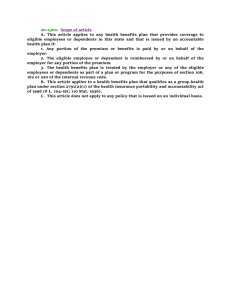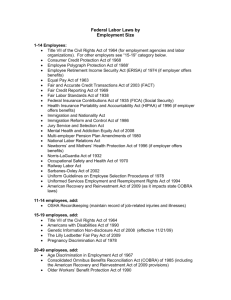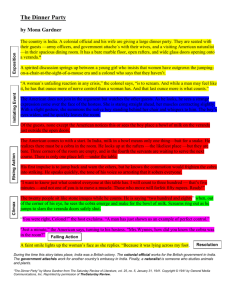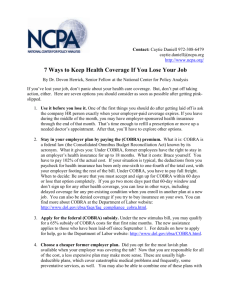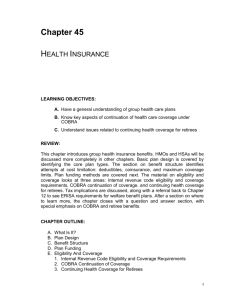Reduction in Force (RIF) and Health Insurance for RIF Employee
advertisement
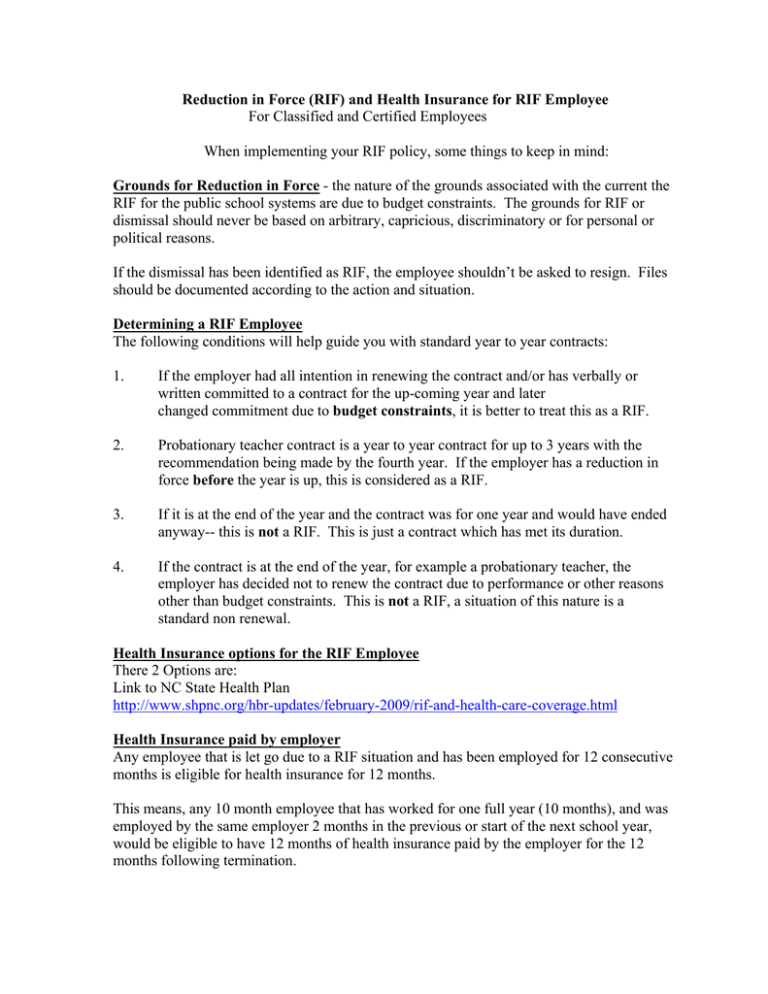
Reduction in Force (RIF) and Health Insurance for RIF Employee For Classified and Certified Employees When implementing your RIF policy, some things to keep in mind: Grounds for Reduction in Force - the nature of the grounds associated with the current the RIF for the public school systems are due to budget constraints. The grounds for RIF or dismissal should never be based on arbitrary, capricious, discriminatory or for personal or political reasons. If the dismissal has been identified as RIF, the employee shouldn’t be asked to resign. Files should be documented according to the action and situation. Determining a RIF Employee The following conditions will help guide you with standard year to year contracts: 1. If the employer had all intention in renewing the contract and/or has verbally or written committed to a contract for the up-coming year and later changed commitment due to budget constraints, it is better to treat this as a RIF. 2. Probationary teacher contract is a year to year contract for up to 3 years with the recommendation being made by the fourth year. If the employer has a reduction in force before the year is up, this is considered as a RIF. 3. If it is at the end of the year and the contract was for one year and would have ended anyway-- this is not a RIF. This is just a contract which has met its duration. 4. If the contract is at the end of the year, for example a probationary teacher, the employer has decided not to renew the contract due to performance or other reasons other than budget constraints. This is not a RIF, a situation of this nature is a standard non renewal. Health Insurance options for the RIF Employee There 2 Options are: Link to NC State Health Plan http://www.shpnc.org/hbr-updates/february-2009/rif-and-health-care-coverage.html Health Insurance paid by employer Any employee that is let go due to a RIF situation and has been employed for 12 consecutive months is eligible for health insurance for 12 months. This means, any 10 month employee that has worked for one full year (10 months), and was employed by the same employer 2 months in the previous or start of the next school year, would be eligible to have 12 months of health insurance paid by the employer for the 12 months following termination. LEAs would begin the 12 months of insurance benefits for the employee beginning the month after the final payment which fulfilled the employment tenure. Example, the employee is covered thru August because they were employed the preceding year and the current fiscal year, their health insurance is paid through August for the 2 summer months their 12 months paid health insurance would be September 2009 through August 2010. After one year, the former employees and their eligible dependents may continue health coverage on a fully contributory basis. Former employees who choose to continue their coverage after their initial 12 months will be directly billed by Blue Cross Blue Shield of North Carolina. Health Insurance paid by employee (COBRA) An employee, who has not met the 12 months consecutive rule, is eligible for reduced COBRA for nine months. All guidance on COBRA can be found on the NC State Health Plan (SHPNC) website. Q & A on COBRA http://www.shpnc.org/hbr-updates/April-2009/faqs-cobra-subsidy-rif.pdf A Few items from the SHPNC You are considered eligible for the COBRA subsidy if you are an Assistance Eligible Individual (AEI). You are an AEI if: • you were terminated from your job involuntarily for any reason other than gross misconduct on or after September 1, 2008 and prior to December 31, 2009; • you are not eligible for other group health plan coverage, including Medicare; and • you elect to continue the employer-provided coverage under COBRA. Employees who do not have 12 months of consecutive service may continue health care coverage at full cost under COBRA (for themselves and any eligible dependents). Dependents enrolled on your plan at the time you lost employment, they are considered a qualified beneficiary and therefore eligible for the subsidy. This means your spouse (as defined by federal/state laws) and dependent children (as defined by the Plan). This special election period does not extend the period of COBRA continuation coverage beyond the original maximum period (generally 18 months from the employee's involuntary termination). COBRA coverage elected in this special election period begins with the first period of coverage beginning on or after February 17, 2009. You may receive the subsidy for up to nine (9) months. However it may end earlier if you become eligible for Medicare or another group health plan (such as a plan sponsored by a new employer or a spouse’s employer). If you plan to continue your COBRA coverage after the premium subsidy period, you will have to pay the full amount of the COBRA premium. Failure to pay your COBRA premium may result in loss of COBRA coverage. Individuals paying reduced COBRA premiums must notify their plans if they become eligible for coverage under another group health plan or Medicare. Failure to do so can result in a tax penalty of 110% of the COBRA subsidy. If you have any questions, please contact Joan T. Crump at the N.C. Department of Public Instruction on 919-807-3366, or email jcrump@dpi.state.nc.us.
